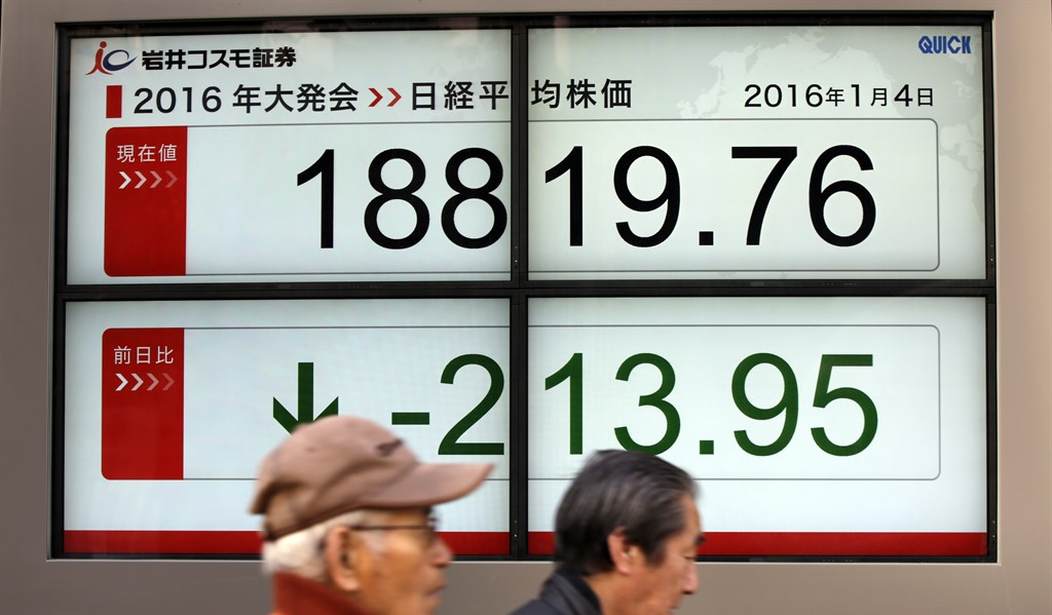Battening down the hatches. That's what America and much of the rest of the world seem to be doing today, in an eerie re-enactment, though to much less of a degree, of what America and the world did in the 1930s. The result then wasn't very pretty. The result now is unknown.
One way the hatches are being battened down is that the volume of world trade has been declining, and not just temporarily, in response to the financial crisis of fall 2008.
Consider something that most people don't think much about: international trade. Listening to the political dialogue this year, one might suppose that increased trade only drains jobs from advanced countries like the United States.
But in a broader perspective, greater trade produces greater productivity and growth. "International shipments broaden the pool of customers for a given product," writes The Wall Street Journal's William Mauldin, "and enhance competition and specialization, cutting prices for consumers."
Go to your local Wal-Mart or one of its competitors and you will see the effect. Prices for clothing and food have tended to decline over the last 40 years, something American consumers may take for granted, but which they may come to miss if trade flows stagnate.
And that may be happening. International trade dropped sharply after the financial crisis in 2008, rebounded in 2010, but has grown only about 3 percent a year since, compared to a 6 percent annual rate from 1983 to 2008. In that period world trade grew faster than the world economy as a whole. Now it is growing slower.
That's reminiscent of something far more drastic that happened in the early 1930s. As the famous spiral graph of economic historian Charles Kindleberger shows, world trade volumes declined by 67 percent between January 1929 and March 1933. That was almost double the 38 percent decline in world production.
Recommended
This decline was exacerbated by trade restrictions, starting with the United States' Smoot-Hawley Tariff Act of 1930, which inspired higher tariffs and trade barriers in Europe and elsewhere. Nations trying to protect themselves from harm hurt the world as a whole -- and themselves.
So it's a little chilling to see that the poll leaders for both parties' presidential nominations -- Donald Trump and Hillary Clinton -- are opposing the Trans-Pacific trade agreement negotiated by the Obama administration. And that Majority Leader Mitch McConnell has withdrawn it for the next year from consideration in the Senate, the house of Congress usually more amenable to free trade. Meanwhile, negotiations for a trans-Atlantic trade agreement have not reached fruition.
Another factor is at work: a sharp slowdown in China's growth rates, to what level, no one is sure. From 1982 to 2008 China's double-digit annual growth rate helped power world economic growth, lifting hundreds of millions out of poverty there and providing increasingly inexpensive consumer goods and high-tech products in advanced countries.
For the Chinese, that growth rate restores China to its natural position as a great economic power, after an unpleasant 140-year interval of rebellion, revolution, civil war and Communist oppression. For the world, it has been a boost to growth whose magnitude is unlikely ever to be replicated.
The prospect of stagnant world trade and growing trade barriers may be cheered by those who think that will bring back the auto assembly plants of the 1960s. But battening down the hatches tends to make the air inside stale and to hinder the ship from moving forward.
A similar phenomenon may be happening: tightening of the borders. Some of this is necessary and beneficial. There is no reason to tolerate mass low-skill illegal immigration (which in fact has vastly diminished, down toward zero in the case of Mexico, since 2007).
And there are good reasons to be especially watchful about Muslims seeking visas or green cards, given the significant amount (though low percentage) of terrorists who are likely to be in their numbers. This is not nativism or bigotry but common sense.
But tightening the borders has already reduced the flow of visiting students and tourists -- not a good thing. Neither is our politicians' inability to encourage more high-skill immigration.
These developments, again, are not nearly as dire as the situation in the 1930s, when immigration was close to zero and we blocked the entry of most Jewish and political refugees from Nazi-threatened Europe. That decade was brought to a close by world war. Let's hope that battening down the hatches today doesn't come to a similar end.
























Join the conversation as a VIP Member